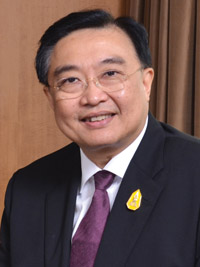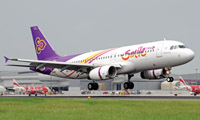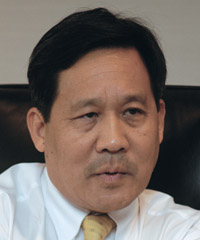Cover Story
STARRING ROLE
Thai Airways International’s (THAI) new president, Sorajak Kasemsuvan, is a film buff. A former secretary general of the Thai Film Federation, he once had aspirations to be a movie director. Today, the former head of the state-controlled media company, MCOT, and ex-culture minister, has his own starring role at THAI. But will he win over the critics?
March 1st 2013
Fifty-eight-year-old Sorajak Kasemsuvan is THAI’s sixth president in the last 12 years (see separate story). He is a very different character to his predecessor, Piyasvasti Amranand, who was ousted for “communication issues” with the board. Read More »
 |
| 'When you are continually cost-cutting and staff are not getting pay rises, it’s bound to affect morale' |
| Sorajak Kasemsuvan President Thai Airways International |
A former energy minister, Piyasvasti was a hero to many of his staff. His determination to stand up to an interfering board of directors made up of political heavyweights from Thailand’s finance ministry and senior military officers, and his crusade to rid the carrier of cronyism earned him widespread respect within the airline and the industry at large.
But, in the end, his employers branded the former government minister a villain and once again wielded its bloodied axe.
Quiet and unassuming, Sorajak, who is a former culture minister in the Thai government, is far from confrontational. He is supportive of his board saying “the only interference is natural interference”.
“[The government] has representatives on the board and they might have a direction they want us to follow. But this is not affecting what we are doing commercially,” he said.
The president admitted, however, that the airline did have problems he needed to solve. Raising low morale is a priority, said Sorajak.
Ironically, this was created by “drastic” cost-cutting, according to Sorajak. This, in turn, led to an eroding of the airline’s Thai spirit, what the president calls “Thai-ness”, a fall in service standards and drop in morale.
He is looking to redress the situation in the current financial year. “When you are continually cost-cutting and staff are not getting pay rises, it’s bound to affect morale. It’s only human nature,” said Sorajak.
He said some of the measures taken to slash costs under the leadership of Piyasvasti would be reversed. The more than 5,000 members of the THAI flight crews would be amongst the first to benefit.
Sorajak said the Thai smile had been a trademark of THAI service in the past, but in more recent times the smile had slipped. He wanted to see it return to the faces of those on the front line, on board its aircraft, as well as boosting other aspects of “Thai-ness”, including “the best food in the sky” and the promotion of Thai products and fabrics.
 |
| THAI Smile: looking to add more regional routes |
He wants visitors to the country to start their Thai experience as soon as they step on board. “We need to build the Thailand brand as it will be our competitive edge,” he said.
The airline is pulling out all the stops to re-brand itself starting with its biggest investment – the fleet.
THAI is replacing 75 of its 100-aircraft fleet and has another 37 planes on order. It was Airbus’ ninth customer for the A380 and has four of its order of six aircraft in service. Seventeen planes will be delivered during 2013 and new seats installed throughout the fleet during the year.
More orders are to come. Sorajak said long range jets were on the THAI radar. “We are waiting to see what the Airbus and Boeing next generation aircraft will bring,” he said.
Sorajak also has named 2013 as THAI Digital Year when the airline will be given a major technology upgrade. There will be a particular focus on promoting online ticket sales as the airline looks to increase revenue.
Direct sales account for about 9% of THAI’s revenue. By improving online services, it is hoped to push this figure to beyond 15%.
Routes and frequencies have been cut in recent years and only one new route – Sapporo, Japan - was opened last year. No new destinations are planned for 2013 although its subsidiary regional carrier, THAI Smile, may launch routes before the end of the year.
However, the Tourism Authority of Thailand was conducting feasibility studies, which could lead to THAI eventually introducing new destinations. Sorajak said the main targets were China, India and Russia. Russian visitors have been increasing at 20% a year. “Two years ago, there were 800,000 Russian visitors to Thailand. Last year that figure had risen to 1.2 million,” said Sorajak.
THAI has not had it easy in recent years. It has been hit by a series of crises beyond its control which had a dramatic affect on its bottom line. There were politically inspired airport closures followed by riots in Bangkok that hit the world headlines. Tourism slumped.
No sooner had the airline recovered from those events than serious flooding dealt another blow to the capital city and THAI’s balance sheet.
Although last year had its ups and downs, THAI is expected to announce a profit of US$202 million for 2012, following a net loss of $335 million the previous year. Sorajak said he refused to take credit for the 2012 performance, but believes THAI will top the $200 million profit in the current year.
He wants to see the carrier increase its competitiveness in one of the world’s most competitive hubs. His predecessor, Piyasvasti, believed this would be achieved by reducing the government’s 51% shareholding to a minority 49%.
Sorajak said there are no plans for this move. He wants to consolidate the airline’s position by increasing its partnerships with its fellow Star Alliance members as well as striking up agreements with carriers outside the grouping.
THAI is also expanding the role of its subsidiary, THAI Smile, which was launched in July last year. Described as a “lite” carrier which fits somewhere between a low-cost airline and a full service carrier, Smile has five A320s in service. It currently serves seven domestic routes and one regional (Macau). It will add Mandalay, Myanmar, to its network this month.
The Smile fleet will comprise of 11 A320s by 2016 with routes added to neighbouring Association of South East Asian Nations (ASEAN) destinations. It will put particular focus on southern China.
THAI also holds a majority 37% shareholding in low-cost carrier Nok Air which, said Sorajak, “is making money”.
Sorajak was first offered the THAI president’s job in 2005. “I declined the offer. I felt I wasn’t ready for it,” he said. “At the time I thought I would not have the chance again.”
Seven years on he has been given a second chance. Ironically, Sorajak will retire in less than two years when he reaches 60 years of age. He has little time to make his presence felt. But given the record of the THAI president’s office, that could be a blessing in disguise.
Roll call of THAI’s fallen chiefs
 |
| Piyasvasti Amranand: surprisingly ousted by the board last year |
The 21st century has proved something of a graveyard for THAI presidents. There have been six during the first 13 years.
2000: a popular 30-year veteran at THAI, Bhisit Kuslayanon, was appointed president in October following the retirement of Thamnoon Wanglee. Bhisit lasted less than a year before being sacked by the country’s then prime minister and now disgraced exile, Thaksin Shinawatra, who went on record that year to say that “THAI sucks”.
Bhisit endured a tumultuous few months in charge, including a bomb blast on a B737 at Don Muang airport in Bangkok, which killed one person and injured seven. Sources said at the time that Bhisit’s downfall was politics. They claimed he was not a political player in an airline 51% owned by Thailand’s finance ministry.
2002: Kanok Abhiradee, who had no previous airline experience, was named as Bhisit’s successor in May. He was credited with demanding transparency at an airline not noted for its openness, often inviting the press to purchasing meetings. He was awarded Orient Aviation’s Person of the Year in 2004 for “re-envigorating the airline during a period of serious crisis for the airline industry”.
But less than a year later, following a slump in profits, caused not least by the fall-off in traffic following the devastating tsunami that hit Phuket in December, 2004, he was suspended by the board. Three months later he was out of a job.
2006: a career pilot, Capt. Apinan Sumanaseni, was appointed president in May. He resigned two and a half years later citing disagreements with the board and health reasons.
2009: In June, a former Thai minister of energy, Piyasvasti Amranand, was named president. And he left no one in any doubt what he was about. In an interview with Orient Aviation six months into the job he said: “In the last five years we have seen major intervention by the board of directors at Thai Airways. So much so that the airline’s management stopped managing.”
After consulting previous presidents, Piyasvasti attempted to protect himself against the whims and fancies of the board by taking three months to thrash out an employment contract that would allow him the flexibility and freedom to achieve his goals. Once again, the THAI board called time on their president and he left the company in June last year.
2012: Sorajak Kasemsuvan succeeded Piyasvasti in October. With less than two years to go before retirement, who would bet on him lasting that long.